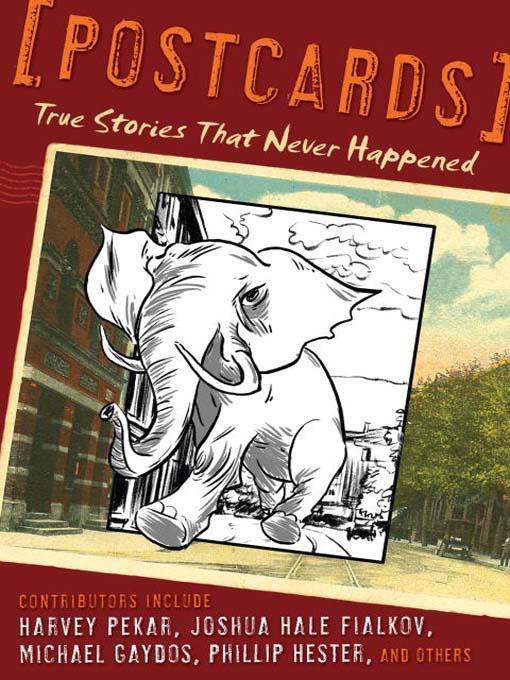
Postcards
True Stories That Never Happened
- اطلاعات
- نقد و بررسی
- دیدگاه کاربران
نقد و بررسی

June 11, 2007
The premise behind this anthology is clever: editor Rodriguez bought a batch of vintage picture postcards, gave them to various cartoonists from varying backgrounds and commissioned 16 short stories inspired by the brief, sometimes cryptic messages written on each card, preceded by reproductions of the cards themselves. The biggest names in the book are Harvey Pekar and Joyce Brabner, who, true to form, write about the postcard that introduced the two of them; the most engaging piece, though, is Stuart Moore and Michael Gaydos's deadpan but deeply silly tale of “traveling tic-tac-toe hustlers.” Other highlights include Phillip Hester's elaboration on an Easter card, concerning an unlikely spiritual awakening, and Joshua Hale Fialkov and Micah Farritor's subdued sketch about a pair of Americans in France during the Great Depression. Unfortunately, many stories lapse into sentimentality (like the saccharine contributions by Tom Beland and James W. Powell) or stretch the book's premise awkwardly. One piece somehow twists a whimsical postcard into a brutal horror story; another is an unfunny parody of old superhero comics. And curiously, only a few stories address the images on the cards at all or do much with the peculiar and evocative visual style of those pictures.

July 1, 2007
Gr 10 Up-Rodriguez discovered that message-filled postcards for sale in antique stores and flea markets can make excellent prompts for writers and artists. Each of the 16 short stories collected here opens with an image of the real postcard message that the creators then gave new lifeor explanationin the form of its imagined premise or effect. The message writers range from a man shipping out during World War II to a woman writing affectionately to another woman in 1917, from an exceedingly brief note, posted in 1909, abjuring the recipient to "look under stamp," to an only slightly more expansive apology from the sender who could not go fishing with the recipient. The woven tales are set in the appropriate historical periods and show such possibilities as the soldier's subsequent battle heroics, the fate of a friendship sundered by class differences, an antic fable of tic-tac-toe con artists, the death of a young girl's mother, and more. Contributing writers include Ande Parks, Phillip Hester, and Rick Spears. A coda to the volume is Harvey Pekar and Joyce Babner's own story of their marriage as it relates to postcards, with art by Matt Kindt. This book will delight browsers and has a place in creative-writing classes, as well as offering supplementary material for American-history students in search of slice-of-life insights. Libraries are featured in no fewer than a quarter of these tales."Francisca Goldsmith, Berkeley Public Library, CA"
Copyright 2007 School Library Journal, LLC Used with permission.

June 1, 2007
As the title suggests, the inspiration for each of the graphic short stories in this anthology was one of the antique, used postcards in the editor's collection. Sixteen stories by more than 25 contributors, many with multiple award nominations, provide a wide variety of styles in art and storytelling. Each piece is introduced by Rodriguez with an explanation of his expectations from each postcard and how, more often than not, the artists and writers went above and beyond what he imagined. A number of the stories allow for brief, poignant glimpses into the characters' lives, like an American couple taking refuge in Paris during the Depression; two tic-tac-toe hustlers trying for one more scam; a mother hiding her illness from her playful, young daughter; and an elderly man missing his deceased wife. One lighter adventure is a tongue-in-cheek tribute to the Golden Age of comics starring a superhero known as the Midnight Caller. A collaboration by Harvey Pekar, Joyce Brabner, and Matt Kindt illustrates how a life can be summed up simply in the cards and letters one receives. Readers of the popular Flight volumes will enjoy the anthology format, but Postcards will appeal more to those who lean toward real-life tales like Brian Fies's Mom's Cancer, Alison Bechdel's Fun Home, or Marjane Satrapi's Persepolis. Older teens and adults will appreciate the book's themes and art. In addition to the black-and-white artwork, Postcards will feature an eight-page full-color insert, although this was not available in the galley copy. Recommended.Don Boozer, Cleveland P.L.
Copyright 2007 Library Journal, LLC Used with permission.

June 1, 2007
Bored on an antiquing jaunt with his girlfriend, editor Rodriguez discovered the joy of old, mailed postcards. Their brief messages and their writers and recipients genders conjured ordinary life stories otherwise buried in the past. Sharing his enthusiasm and cards with comics creators, he suggested they elaborate on what they saw in cards that intrigued them. This book contains 16 of their responses, realistic stories that, since the preponderance of their inspirations are dated 190025, unfold with the sad inevitability of literary naturalism, in its heyday during that period. Most tell of broken faith, promises, and friendships; some are their protagonists decades-later perspectives on the past. Only one, an affectionate masked-crime-fighter parody, is fantastic. Two are set much later and follow, respectively, a soldier shipping out to North Africa in 1942 and the marriage of nonfiction comics standard-bearers Harvey Pekar and Joyce Brabner. In general, the artists involved prove more impressive than the writers, though Joshua Hale Fialkov and Micah Farritor are twin high achievers in Homesick, set in Paris in 1930. A good concept well enough executed.(Reprinted with permission of Booklist, copyright 2007, American Library Association.)




دیدگاه کاربران